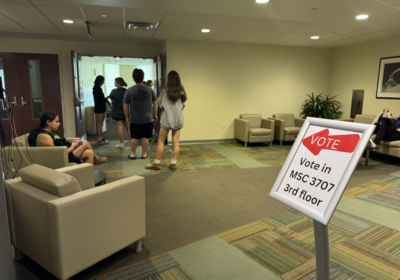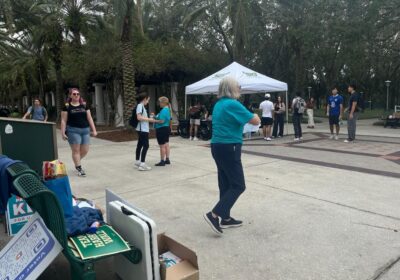Students displaced by Hurricane Maria fight to keep in-state tuition

The Boricua Student Association is requesting an in-state tuition extension through 2023 for Puerto Rican students affected by Hurricane Maria. ORACLE PHOTO/LEDA ALVIM
The future of 20 Puerto-Rican and U.S. Virgin Island students at USF is undecided as the in-state tuition waiver, offered after Hurricane Maria hit the islands, expired at the end of the spring semester.
With the financial burden of paying out-of-state tuition, students from the Boricua Student Association (BSA) wrote an open letter to USF System President Judy Genshaft and the Board of Trustees (BOT) requesting an extension of the waiver.
The waiver, granted in 2017 by several public universities across Florida, offered in-state tuition prices to all students displaced by the hurricane to continue their studies and recover from the storm’s aftermath.
With the waiver’s expiration, a full-time student would have to pay $17,324 for 30 credit hours, compared to $6,410 should they maintain their in-state status.
In the letter, BSA requested the waiver extension through 2023 to ensure that displaced students can finish their academic careers at USF. University of Central Florida (UCF) and Florida International University (FIU) are among the public universities in Florida that extended the in-state tuition waiver until the same year.
According to Paul Dosal, vice president for Student Success, the request to extend for four more years is unnecessary.
“I have no doubt that the island hasn’t fully recovered from the hurricane … but a lot of these students are about to graduate,” Dosal said. “I don’t think they’re going to be here in 2023. When the students requested for all waivers to be extended to 2023, it struck me as unnecessary.”
In addition, the University of Puerto Rico (UPR) requested all universities across Florida in a letter to stop accepting transfer students as a way to help its recovery. According to Dosal, USF didn’t want to be seen as taking advantage of the crisis to boost the student enrollment.
“We need to be very careful about being seen as trying to take students who should rightfully be at the University of Puerto Rico, which is kind of tough,” Dosal said. “So what we have done in our policy is to try to take a moderate and case by case approach. We were taking them in an emergency situation and then once the emergency was passed and UPR was ready to take them back, those students would go back.”
Joel Yap Santana, president of BSA, said that the education of the students under the in-state tuition waiver are at risk without the waiver’s extension.
“On top of dealing with the aftermath of Hurricane Maria, students have this insecurity with their education,” Joel said. “Other universities have done it and, taking into consideration what USF stands for, it just makes sense that they would try to put their students’ needs a priority as much as they can.”
In response to the letter, the university determined that they will use a case-by-case approach to analyze each student’s financial needs individually, due to the small number of students previously eligible for the in-state tuition waiver.
The student must have been admitted to USF in spring 2017 and have a completed Free Application for Federal Student Aid (FAFSA) on file, along with any required supporting documentation to demonstrate financial need for the year the benefit is approved.
If the criteria are met, the student’s respective college will be required to send a degree audit to determine the minimum number of hours needed for the student to graduate.
Monica Santana, the former treasurer of BSA, said students from Puerto Rico and the U.S. Virgin Islands are still dealing with the hurricane’s aftermath and by extending until 2023, it will help students finish their education at USF.
“By extending it to 2023, it will allow students to finish what they started here USF paying the in-state tuition,” Monica said. “Although it’s been almost a year and a half since the hurricane hit the island, Puerto Rico is still in a huge economic crisis where many people lost their jobs, including the parents of some of our students.”
The decision will be based upon if the student was displaced by the hurricane and if they would experience extreme financial difficulty if required to pay out of state tuition.
“If a student who can go home and doesn’t have financial need, then we don’t have to extend the waiver,” Dosal said.
USF first announced the decision to grant the in-state tuition waiver following a request by former Governor Rick Scott (R) in 2017. After offering the waiver for a year, USF extended it until spring 2019.
According to Monica, until the decision is final, students taking summer classes are having to pay for out-of-state tuition, which could later impact their graduation plans.
One of these students is Natalia Requejo, who is having to take out loans as a way to pay for her out-of-state tuition.
“It’s really frustrating,” Requejo said. “They are saying that they will look into it case-by-case but they didn’t give us any date of when the decision will be made. I’m taking loans to pay out-of-state tuition for the summer classes which I might not even be able to transfer if I have to go back to Puerto Rico. At this point, I’m just wasting money.”
For students in a similar situation to Requejo’s, Monica said some are being forced to take fewer classes due to a lack of financial resources.
“Most of them have reached out to us and they’ve told us they’re going to become part-time to be able to cover the difference,” Monica said. “Others don’t even know what option they have right now.
“Going back home isn’t a feasible option.”







